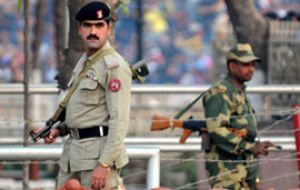MercoPress. South Atlantic News Agency
Mumbai attacks leave India and Pakistan on edge of conflict
 New Delhi accuses Pakistani “elements” of being behind deadly Mumbai attacks
New Delhi accuses Pakistani “elements” of being behind deadly Mumbai attacks India on Monday made it clear that the deadly terror strikes in Mumbai were carried out by Pakistan-based militants and asked Islamabad to take “strong action” against the “elements responsible for this outrage” - a sign that ties between the two countries are headed for a rocky patch.
The Indian external affairs ministry summoned Pakistan's High Commissioner Shahid Malik in New Delhi and told him sternly that Pakistan's actions must match its January 6, 2004, pledge not to allow its territory for anti-India terror strikes if it wanted better bilateral ties. Meanwhile, hours after India summoned Pakistan's envoy, Islamabad responded in a similar manner. The Indian High Commissioner Satyabrata Pal in Islamabad was summoned by Pakistn to deny India's charges, Geo TV reported. In New Delhi, Pakistan High Commissioner Shahid Malik was "informed that the recent terrorist attack on Mumbai was carried out by elements from Pakistan," the external affairs ministry said in a statement on Monday evening. "The government expects that strong action would be taken against those elements, whosoever they may be, responsible for this outrage," the ministry underlined. "It was conveyed to the Pakistan high commissioner that Pakistan's actions needed to match the sentiments expressed by its leadership that it wishes to have a qualitatively new relationship with India," the ministry said. New Delhi also demanded the extradition of known terror masterminds like underworld don Dawood Ibrahim, Maulana Masood Azhar, and LeT chief Hafez Mohammed Sayeed, who are suspected to have a hand in major terror strikes against India, sources added. A day after the November 26 Mumbai terror strikes that left at least 183 people dead, India had indicated the involvement of "elements in Pakistan" in this meticulously choreographed attacks at 10 landmarks in India's financial capital. Terrorists came to Mumbai via the sea route from Karachi along the Gujarat coast, according to preliminary findings. Subsequent investigations have yielded more damning evidence of the complicity of Pakistan-based militants in the Mumbai attacks that now threaten to derail the peace process between the two nuclear-armed neighbours. The interrogation of the lone surviving terrorist, who was caught alive during an attack at Chowpatty, has also disclosed that the Mumbai terror plot was hatched in Pakistan, according to intelligence agencies. The arrested militant, Ajmal Qasab, has confessed that he was trained at a camp in Pakistan by Lashkar-e-Taiba, a banned militant outfit which was created by Pakistan's ISI to foment insurgency in Jammu and Kashmir. The Pakistani government has vehemently denied any link to the Mumbai blasts, but has not ruled out the possibility of the involvement of "non-state actors" in the brazen terror strikes. "Such a tragic incident must bring opportunity rather than the defeat of a nation," Pakistan President Asif Ali Zardari said on Monday in an interview with a Pakistani news channel. "We don't think the world's great nations and countries can be held hostage by non-state actors." Pakistan's Prime Minister Yousuf Raza Gilani has called for a meeting of all political parties' leaders on Tuesday to evolve a consensus on Pakistan's policy towards India in the aftermath of the Mumbai attacks. Pakistan's prime minister, president and foreign minister have also launched a diplomatic offensive and are calling up Western capitals to convince them that the Pakistani state did not have a hand in the terror strikes in Mumbai. With the India-Pakistan peace process coming under strain, US President George W Bush has asked Secretary of State Condoleezza Rice to travel to India to underline solidarity with India in the fight against terrorism. At least 20 foreigners, including six US citizens and nine Israelis, have been killed in the mayhem in Mumbai unleashed by terrorists. The Mumbai attacks also had its political toll beginning with the resignation of Home Minister Shivraj Patil on Sunday, who said he took "moral responsibility". More resignations are expected as questions have been asked about India's failure to pre-empt the attacks, and the time taken to eliminate the gunmen. A report in the Hindustani Times newspaper said a militant from the Pakistan-based group Lashkar-e-Toiba arrested and questioned in February told intelligence services he had inspected the five-star Taj Mahal Palace and Oberoi-Trident hotels, which were among targets attacked last week, and several other buildings in December 2007.




Top Comments
Disclaimer & comment rulesCommenting for this story is now closed.
If you have a Facebook account, become a fan and comment on our Facebook Page!